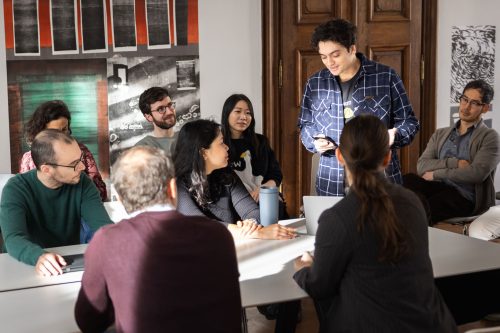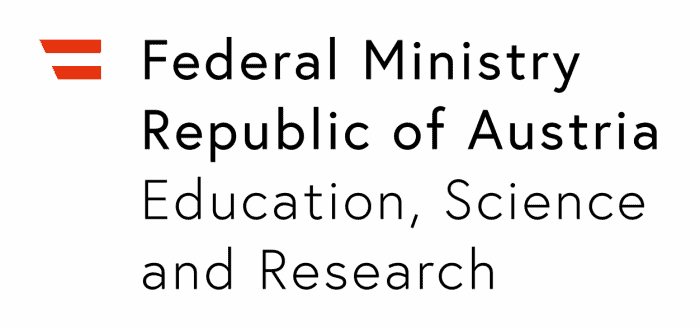Education
Graduate Program in Complexity Science
An Initiative of the Digital Innovation School
Do you want to use science to change the world? Join the Complexity Science Hub for your PhD. We combine big data with quantitative modeling and rigorous theory to solve critical real-world challenges.
Program Goals
We are looking for students who want to use their exceptional knowledge and skills to make a meaningful difference in society – whether supporting the green transition, combating crime and misinformation, improving healthcare outcomes, or building more equitable economies.
Our PhD training program enables students to:
- Recognize the questions of critical importance to the health of society and the planet and that will benefit from large datasets and innovative digital methods and tools
- Use tools and approaches of complex systems and data and network science to address real-world questions
- Work with proprietary datasets and develop novel methods of analysis, modeling, and data visualization to gain a deep understanding of systems
- Communicate and collaborate with decision-makers from government, industry, and other organization and use research to improve practices and implement better policies
Audience
The program is aimed at students with backgrounds in the natural and social sciences and mathematics who have a strong foundation in quantitative approaches. Applicants should be interested in having a substantial degree of independence in their work and be curious about a breadth of topics within the research areas of the Complexity Science Hub. They should be open communicators, and enjoy collaboration and sharing their expertise and ideas with others. Students of any nationality are welcome to apply. The program encourages applications from women and persons from groups that have been historically excluded from the sciences. This is an in-person program; accepted students must be willing to relocate to Vienna, Austria, which is continually ranked as one of the world’s most liveable cities.

Funding
The graduate program has a limited number of fully funded opportunities for exceptional students to do their doctoral studies at the Complexity Science Hub and one of its partner universities. Students receive an annual salary of EUR 37557 (before tax and social security withholding) and an annual scientific travel allowance. Health insurance and pension is provided.
Structure & Curriculum
The program consists of:
- independent thesis research, determined by each student’s interests
- two ~3-month research exchanges: one in government, public administration, or EU institution; and one in industry or business
- coursework and workshops, including an annual series of CSH “master classes” led by prominent guest lecturers
- participation in the CSH research talk series, with regular presentations
- organization of and participation in an annual student symposium
Thesis research extends from ongoing research at the CSH, often in collaboration with external partners from both academic and non-academic sectors. Each student will identify a Digital Innovation School faculty member to serve as their research advisor and to guide the project. The advisor will help with research project design and realization and help students reach the forefront of science. A thesis advisory committee helps the student set and achieve their research goals and adds a broader perspective. The CSH DIS office supports students through all aspects of the thesis. Additional advising is provided by our partner university faculty and staff.
Courses are offered both by CSH and by our partner universities, one of which will serve as the degree-granting entity. Students will be guided to the appropriate university and courses for their interests with the help of their mentor and the graduate program office.
Timeline & Milestones
The CSH graduate program can be completed in three years, with an optional fourth year when needed and contingent on funding. Students begin in September-October, and, after a brief orientation and skills workshop, embark on thesis research. Each year of the program includes research, coursework, presentations to the CSH research community, and a graduate student symposium. Once per year, students meet with their thesis advisory committee to discuss progress and set goals. Students must have published, or submitted their work for publication, in order to defend their thesis. CSH expects students to produce at least three first-author research papers. The successful defense and acceptance of the written dissertation by a dissertation committee are the final steps in the PhD.

Admissions Requirements
- Masters/diploma degree in the natural, physical, or social sciences, mathematics, computer science, engineering, or related disciplines with a strong quantitative foundation; or another degree but with at least two years of full-time research experience in a quantitative area.
- Prior independent research experience so as to be familiar with the research process
- Comfort with a programming language such as Python, R, Mathematica, Matlab, or Julia, or a database management and query language such as SQL; and/or substantial experience with statistical packages such as SPSS, SAS, or Stata
- Proficiency in English*
The application deadline has passed for students wishing to begin their studies in September-October 2024.
Please check back in October 2024, when we plan to open the next call for applications with an application deadline in December 2024.
Contact

Carrie Cowan leads the graduate program office, which supports students with all aspects of their doctoral studies at CSH. Please consult our FAQ page for answers to common questions or contact us at grad@csh.ac.at.
About the Complexity Science Hub
The Complexity Science Hub (CSH) is Europe’s research center for the study of complex systems. We derive meaning from data from a range of disciplines – economics, medicine, ecology, and the social sciences – as a basis for actionable solutions for a better world. Established in 2015, we have grown to over 70 researchers, driven by the increasing demand to gain a genuine understanding of the networks that underlie society, from healthcare to supply chains. Through our complexity science approaches linking physics, mathematics, and computational modeling with data and network science, we develop the capacity to address today’s and tomorrow’s challenges.
University Partners
Institutional Partners
Digital Innovation School
The Digital Innovation School is funded by the Federal Chancellery of the Republic of Austria | Bundeskanzleramt & the Austrian Ministry for Education, Science & Research | Bundesministerium für Bildung, Wissenschaft und Forschung


As part of the Digital Competence Offensive for Austria, the Federal Chancellery (BKA) and the Federal Ministry of Education, Science, and Research (BMBWF) are implementing a joint initiative to develop and secure a technologically advanced workforce for Austria. Under this initiative, Austria is establishing a Digital Innovation School for graduate education in order to better meet the demand for highly qualified information technology professionals. Graduates will shape digital transformation at a world-class level. In addition to technical skills, the Digital Innovation School will impart skills for managing transformation processes. Through the activities of the Digital Innovation School, an exceptionally skilled digital workforce will be available to meet the current and future needs of Austria.
* A TOEFL or IELTS test is not required. English is the working language at CSH. German language skills are not required but are provided at CSH for interested students.